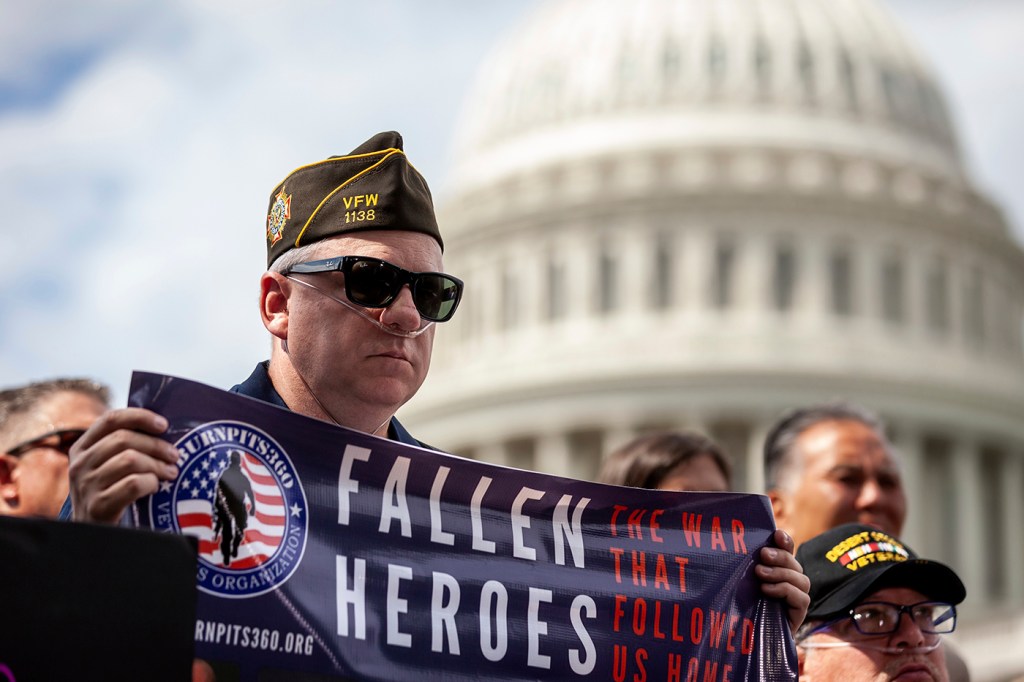PACT Act delay part of ‘long history’ of failure to care for America’s veterans, experts say

A bill that would have expanded medical coverage for veterans who were exposed to toxic burn pits failed to pass in the U.S. Senate on Thursday when 25 Republicans unexpectedly voted no, NBC News reports.
Veterans of conflicts in Iraq and Afghanistan claim to have developed conditions like asthma and cancer following their exposure to toxic burn pits; however, over 70% of related disability claims are denied by Veterans Affairs, according to NBC News.
The Sergeant First Class Heath Robinson Honoring Our Promise to Address Comprehensive Toxics Act—or, the PACT Act—would have helped resolve this issue for the estimated 3.5 million veterans affected, NBC News reports. The PACT Act had previously passed in the Senate in June, and was expected to easily pass in its second round in the Senate after House revisions.
Instead, 25 Republicans who had previously supported the measure voted no, prompting shock and outrage from the bill’s supporters.
“These 25 senators who broke their promise to veterans are risking more veterans getting sick and dying with every day this is delayed,” Veterans of Foreign Wars National Commander Tim Borland said in a statement following the vote. “We will not let the voices of veterans sick and dying from toxic exposure be ignored.”
“These veterans came home sick, and some are no longer with us,” said Jeremy Butler, the CEO of Iraq and Afghanistan Veterans of America, in a statement. “Sick veterans are dying, and IAVA along with our VSO partners and advocates call on the Senate to fix this immediately.”
U.S. Sen. Rick Scott, R-Florida, blamed Democrats for the bill’s failure, tweeting that they added “a budget gimmick” to the bill. U.S. Sen. Todd Young, R-Indiana, echoed that sentiment in his own statement. “The leadership of the Democratic party double-crossed,” said U.S. Sen. John Cornyn, R-Texas. “This bill will ultimately pass, but it will be more fiscally responsible.”
But veterans like Northeastern’s Andy McCarty, the founding director of Northeastern University’s Dolce Center for the Advancement of Veterans and Servicemembers (CAVS), says that this is a political move and is part of a pattern of failure to provide for former service members’ health.
“We’re good at creating veterans, but we’re not good at taking care of them,” he says.
Toxic burn pits were a common way for soldiers to dispose of waste in military bases in Iraq and Afghanistan, McCarty says. Human waste, chemicals, plastics and more were collected in pits and burned with jet fuel. Some troops were tasked with stirring the mixture so it would continue to burn, which brought them very close to the fire’s emissions.
The link between the burn pits and health issues, McCarty says, is indisputable. “We’ve known that a lot of these chemicals are toxic,” he says. “They are directly linked to cancers and different health impacts.”
McCarty knows veterans who were healthy before deployment and now have asthma; another, a friend of his, developed lung cancer. “[He was the] image of health, and then all of a sudden he’s got stage four lung cancer,” he says. “He knew it was directly caused by the burn pits near where he was stationed.”
McCarty was surprised that the bill didn’t pass considering its prior success in the Senate; he thinks it was voted down for political gain. “It’s really disconcerting, it’s disheartening,” he says.
At the same time, the Senate’s failure to pass the bill fits with a pattern in U.S. history, says Phil Brown, university distinguished professor of sociology and health sciences and director of the Social Science Environmental Health Research Institute at Northeastern.
“It’s a long history of the military putting their GIs in harm’s way and then denying the connection between exposure and health effects and denying them coverage for them,” he says. “This is the most recent example.”
Historically, with issues like Agent Orange, radiation exposure from nuclear weapons testing and Gulf War Syndrome, “veterans had to fight very hard because they were denied their claims,” Brown says. “This is a kind of similar situation.”
Much of the reluctance to provide care has to do with the expense, he says. “A lot of veterans’ care has been underfunded. And it’s like, you use these people up”—often, low-income people and people of color—”and then you forget about them. You just use them indiscriminately and then you don’t take care of them.”
The Senate will go into recess on Aug. 8, and this will likely delay the legislation further. McCarty is optimistic that the bill will eventually pass. Still, he says, “even if [Thursday’s vote] delays it a day, it was done for political gain, and that’s people’s lives.”
For media inquiries, please contact media@northeastern.edu






